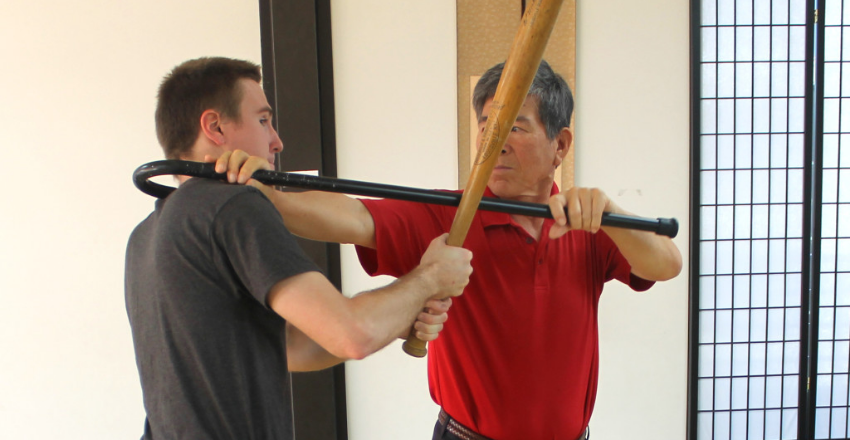At Cane Masters we are often asked for our opinions on self-defense, and the role of a cane as a personal protection device. Our best advice is listed below, but, of course, you should always check with your attorney for a detailed understanding of the “self-defense” laws in your state.
Proper training with a personal protection cane will help you develop the defensive skills to protect yourself and your family against many forms of attack. However, despite how good you are, anyone may be blindsided, or overwhelmed by large number of attackers. If confronted by a criminal wielding a knife, is it worth the risk to defend yourself if the cost of victory is a serious injury to yourself or a loved one? Wisdom shows that money and jewelry may be replaced, where injuries may be fatal. Despite your level of training and skill, success is never a 100% certainty. If you can only succeed in disarming an attacker 99% of the time with your cane … is the other 1 % of risk worth it if you have other alternatives?
The best way never to lose a fight is to avoid it in the first place! Victory is always assured if the altercation never takes place and you are able to safely walk away, even if that means surrendering some of your personal property or dignity. In a world where tempers are volatile and words (and insults) are sometimes hurled towards individuals solely because of the color of their skin, possessions, or because they appear to be “privileged”, a new level of restraint must be learned.
Despite how hurtful, insulting, personal, and threatening the invectives shouted at you may be, they are only words. Holding your tongue and failing to respond is always the best (and safest) response. Avoiding eye contact and exiting the area quickly, quietly, and safely is the preferred course of action. Exchanging insults with an emotionally charged person who may be substance impaired is a prescription for disaster. As tempers escalate, the opportunity to disengage may be lost. And even worst, the single individual insulting you may have a concealed weapon or be joined quickly by a group of his friends which make the odds of survival even less!
Whether you are legally carrying a concealed weapon, or trained to use a cane for personal protection, the obligation to retreat is always the wisest choice. Even in states such as Florida, where you have the legal right to “stand your ground”, the question shifts from IF you should engage in a physical altercation, to SHOULD you engage. Even in instances when you stand your ground, and prevail in defending yourself and your family, victory may be fleeting and followed by years of legal action and court suits. The wisdom to retreat whenever possible assures that you will always depart the winner!
Physically defending yourself or your family should only be undertaken ONLY as a matter of last resort, and when you are genuinely in fear for your life or the lives of your loved ones. Courts (civil and criminal) will later look at matters such as:
1. Did you initiate the conflict?
2. Did you contribute to or escalate the incident by your words or actions?
3. Was there an opportunity for you to retreat and avoid the conflict?
4. Did you use verbal warnings to clearly establish to onlookers that you were the victim, and not the aggressor? Warnings must be clear and spoken (shouted) loudly to be heard by others. Examples of warnings include: “STAND BACK”, “STAY AWAY”, “STOP”, “LEAVE ME ALONE”.
5. If you are forced to defend yourself, did you use a proportional response? For example, shooting an attacker who is simply threatening to punch you would likely be considered a disproportionate response and lead to a criminal charges being filed against you. However, if you are attacked by someone with a lead pipe or baseball bat, and you feel your life is in danger, any act of self-defense you take will likely be considered as justified.
6. The objective of personal protection, and an act of self-defense, should never be to harm or injure the attacker. Instead, your objective should only be to incapacitate him (or her) long enough for you and your family to safely retreat to a place of safety and contact the authorities.
7. Once the attacker was incapacitated and no longer posed a threat, did you continue to injure him?
8. If the attacker was retreating, did you follow him solely for the purpose of inflicting additional injury?
9. The greater the physical disparity between you and your attacker (either in age or stature), the more reasonable your case for self-defense becomes.
10. An attacker carrying any potentially lethal weapon provides additional justification for you to take decisive defensive action and further establishes your right of self-defense.
11. Defending yourself and your family with a cane will invariably be seen as a more reasonable and proportionate response to an attack than drawing and discharging a firearm.
12. Once you reach a place of safety, it is essential that you immediately contact the authorities and report the incident. Essential facts that you should communicate to the 911 operator include:
a. Your name,
b. The number of family members with you,
c. Your present location,
d. The location of the attack,
e. A description of your attacker(s),
f. A statement that “you were in fear of your life and the lives of your family”, and acted in self-defense,
g. Make a request for police support to come to you and to provide additional medical support if necessary.
13. When the police arrive, it is of critical importance to tell the officer ONLY that you were in fear of your life and acted in self-defense. State to the officer that you prefer to make a full statement after you have calmed down and had the opportunity to consult with your attorney. Saying ANYTHING ELSE at this point may later weaken your self-defense claim in civil or criminal court.
14. Depending on your age and the severity of the attack, it may be wise to be transported to the hospital for medical evaluation. This will also provide additional time to collect your thoughts and contact your attorney. However, it is imperative that all statements made to medical personnel at the scene, or later at the hospital be consistent. The simple explanation is that “you were attacked, feared for your life, and defended yourself” is more than sufficient.
15. If you were injured in the attack, the nature of your wounds will be obvious to the medical personnel and don’t require further explanation or justification for your actions. Any statements you make to medical personnel may later be entered into evidence. You should say nothing else about the incident to anyone until you have had the opportunity to seek the counsel of your attorney.
16. If family members were with you when the attack took place, it will be wise to discuss with them the possibility of such an incident in advance. They should also refrain from making any statements until you have spoken with your attorney. Police do not have the authority to question underage children without your permission and you can provide the appropriate responses for them.
17. Many insurance policies for gun owners who have a Concealed Carry Permit also cover defending yourself with a cane or any personal protection device. Take a look at your policy and be certain that the wording in your policy provides you with protection if you are forced to defend yourself with your cane.


Share:
Why You Need At Least TWO Self Defense Canes
How My Cane Rescued Me from the Swamp